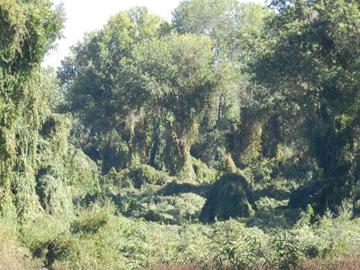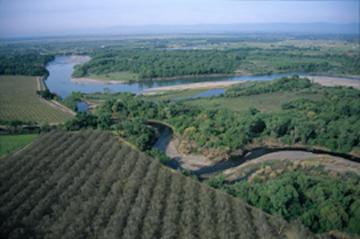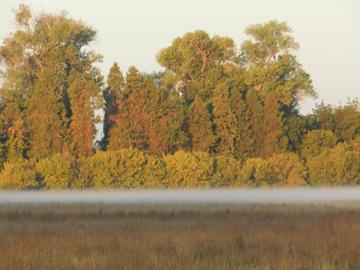Matzek wins grants totaling $110K

Riparian forests covered with woody vines in a Sacramento River slough. Photo by Virginia Matzek.
This summer, Virginia Matzek won two research awards from the California Department of Conservation and the Mid-Peninsula Regional Open Space District. A one-year award of $76,858 will support the development of metrics for habitat quality and carbon quantification in riparian restoration projects, to aid the Department of Conservation in determining which agricultural lands and wildlands to prioritize for conservation and restoration. Matzek will compile published research and technical input from restoration practitioners to develop the new methodology for use by the California Air Resources Board under AB32, the state’s greenhouse gas emissions reduction law. You can read more about the obstacles and opportunities for habitat restoration under the state’s cap-and-trade program in Matzek’s recent paper in Restoration Ecology, or this forthcoming article in Climate Change Economics.

Riparian forests along the Sacramento River floodplain. Photo by Geoff Fricker, used with permission.
The other award, of $33,521, is to test non-herbicidal methods forcontrolling slender false brome (Brachypodium sylvaticum), a non-native grass invading the redwood forest in the Santa Cruz Mountains. The work will be done in conjunction with the San Mateo County Resource Conservation District (RCD) and Mid-Pen. Although herbicides successfully control slender false brome in some areas of the district, in other areas their use is prohibited, and alternatives are needed. The study will determine the most cost-effective alternative, and compare its effectiveness to the herbicides being used elsewhere. Matzek, in keeping with her academic work on how researchers and land managers can work better together, is collaborating closely with Mid-Pen and the RCD to ensure the research is designed to yield practical results.

Morning fog at the edge of riparian forests on the Sacramento River. Photo by Marciel Oliveira, used with permission.